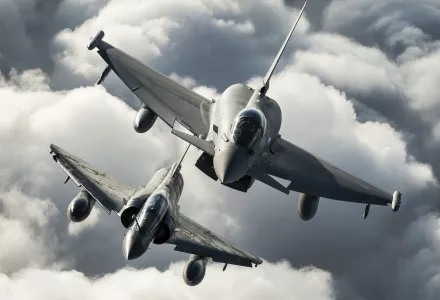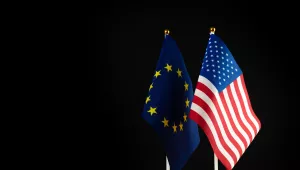
Introduction
Since the end of the Cold War, the European Union (EU) has aspired to a credible and relatively autonomous security and defense policy.1 In that protracted quest, bilateral relations between France and the United Kingdom have remained fundamental. These two sovereign nation-states, former empires, founding members of NATO, nuclear powers, permanent members of the United Nations Security Council, global interventionist actors and, until Brexit, key members of the EU, stand out as the two most consequential military players in Europe. Despite centuries of rivalry and war, despite decades of suspicion and mistrust, despite starkly different political cultures and legal/constitutional frames, France and the United Kingdom have, since 1904, when they finally decided that their vital geostrategic interests converged, remained locked in a “special relationship” that defies easy description.2 From the 1950s, when Paris and London drew diametrically opposite conclusions from the Suez Crisis, through France’s 1966 withdrawal from NATO’s integrated military command structures, and on to the fall of the Berlin Wall in 1989, when UK Prime Minister Margaret Thatcher and French President François Mitterrand embraced radically different approaches to German unification, the two countries appeared to inhabit different universes.
However, the end of the Cold War transformed the global chessboard. As early as 1995, the two countries declared that “we do not see a situation in which the vital interests of either France or the UK could be threatened without the vital interests of the other also being threatened.” In part through mutual “self-discovery” as military actors in the Balkan Wars in the 1990s, Britain and France made history in December 1998 when Prime Minister Tony Blair and President Jacques Chirac, at a summit meeting, signed the “Saint-Malo Declaration” that launched the EU’s much discussed Common Security and Defence Policy (CSDP). For France, this was overwhelmingly a quest for a European project, whereas for the UK it was primarily an attempt to make the EU relevant to NATO. At the time, this difference of interpretation was less important than the need, felt in both countries, to be perceived as making headway towards a meaningful European military capability. That quest continued throughout the 2000s and the 2010s, despite very different approaches, in Paris and London, to geo-strategic challenges as fundamental as the scope of European integration, the nature of transatlantic relations, the wisdom of the Iraq War, and the requirements of regional crisis management.
Despite these differences, the underlying strategic visions of Paris and London continued to converge, leading to the signature, on 20 November 2010, of the two Lancaster House Treaties, covering a range of joint military endeavors including collaboration on aircraft carriers, transport aircraft, UAVs and military satellite technology; on expeditionary forces and combat systems; as well as on a vast range of nuclear programs.3 The underlying thinking behind these Treaties in both Paris and London was that the two countries could only continue to aspire to credibility as global military actors if they combined their efforts. Both states, for rather different reasons, had, by the time of Lancaster House, become somewhat frustrated with the lack of progress on CSDP, which, by the early 2010s, seemed to have run out of steam. History is replete with irony, but rarely more poignantly than in the summer of 2016 when, on 23 June, the UK voted to leave the European Union and the next day, 24 June, the EU published its Global Strategy document asserting its ambition of “strategic autonomy.” Whither Franco-British defense cooperation in such chaotic circumstances? This paper attempts to provide the outline of an answer to that question.
-
Geo-strategic Realities
The first point to note is that the UK’s departure from the EU, in and of itself, does not change by one iota the geo-strategic context in which all European countries, whether or not they are members of the EU or of NATO, find themselves. This is as true for the UK as it is for all other European states. The UK, despite Brexit, is condemned to work out a sensible arrangement for its future security and defense relations with its erstwhile geographic neighbors. Unfortunately, this inescapable reality has, to date, been stymied by two factors:
The Brexit Conundrum
The first has been the overwhelming focus, since Brexit, both in London and in Brussels, on almost every policy area other than defense. The sub-optimal tone and contested substance of the negotiations on the Withdrawal Agreement (status of foreign residents, UK financial contribution, and Ireland) and on the future relationship (especially trade and fisheries) has inevitably had a knock-on effect on the atmosphere in which talks about defense have taken place. Especially since France has played the negotiating role of the “bad cop.” It was particularly French President Emmanuel Macron, often alone at European Councils, who insisted on taking a firm stance in the protracted negotiations and multiple postponements that eventually exhausted the EU. In this context, even though it was reaffirmed on several occasions that Franco-British defence relations had a special dimension and should not be marred by these tensions, it was difficult not to let the discussion suffer as a result. The desire not to give the British negotiators any upper hand by offering them a success even on an unrelated subject, and the fear that this would be seen as a precedent for other areas of negotiation, obviously weighed heavily and prevented the discussions on defence cooperation from moving forward.
The second factor, following on from this, has been that specifically the defense chapter of the negotiations got off to a rocky (and late) start and has never really recovered. Despite asserting a desire to continue to enjoy a “deep and special” military relationship with the EU, the government of Prime Minister Theresa May initially seemed to imply that this positive approach might be a bargaining chip in an effort to obtain better outcomes in other policy areas.4 The UK’s subsequent insistence on being allowed to benefit from exclusive access to EU institutional fora, despite self-exclusion from those very fora, was a significant bone of contention. When May’s unsuccessful bid to carve out a new overall relationship was defeated in the House of Commons, her successor, Boris Johnson, with typical bluster, signified that he, unlike May, did not particularly care to continue a military relationship with the EU.5
All of this had been in limbo since mid-2019, with the controversy over Johnson’s intentions and parliamentary fortunes effectively preventing any movement at all on defense discussions until after his electoral triumph in December 2019. Thereafter, the world was consumed by the Covid-19 crisis and negotiations over Brexit ground to a temporary halt. While, in the somewhat rarefied context of the various Franco-British working parties operating under the Lancaster House Treaties, “nuts and bolts issues” such as UAVs, naval cooperation, nuclear research and expeditionary forces continue to be discussed, there can be no genuine progress until London has decided on a clear strategy.
Strategic Autonomy in a Shifting Transatlantic Landscape
Two crucial factors need to be brought into focus if London is to devise such a lucid strategic concept. Strikingly, these two factors show much stronger UK convergence with recent French initiatives than might have been thought. The first is the UK’s positioning within the broad European debate about the meaning of “strategic autonomy.” The second is the shifting transatlantic paradigm.
Space does not allow us to enter into the detail of what is by now a veritable maelstrom of academic and policy papers on strategic autonomy. Let us simply start from the principle that this is a lasting, and not an ephemeral, European orientation. It is not the result of immediate reversals but the fruit of long-term trends that pre-existed and will survive the current American administration. Therefore, one should take this concept seriously and avoid fudging it with semantic substitutes.
Even for those who accept the idea of strategic autonomy, it is a notion that can cover very different realities and its understanding varies in quite dramatic ways. The French want to see in this objective the construction of European capabilities allowing for more forceful action when European interests are at stake, including without the United States if necessary. Germany is increasingly seeking to acquire industrial capabilities whose production, use and export they have full control over, with incentives to reduce the industrial dependence on the United States.6 Faced with the geopolitical realignments of an openly multipolar and fragmented world, the British are also faced with the need to rethink their strategic posture. In that respect, one crucial factor that cannot fail to influence future UK thinking is the shifting transatlantic paradigm. Three elements are important here.
The first is the much-discussed “special relationship” between the UK and the U.S. Clearly, the two countries share much in terms of history, a compatible economic and trading mindset, a common legal infrastructure, many cultural norms, close intelligence relations and a common language. But they do not share permanent interests. The concept of the “special relationship” was forged by Winston Churchill, to help camouflage the fact that, after 1945, his dream of Britain retaining its status as a great power had already morphed into an illusion. Every U.S. president since World War II (with the exception of Donald Trump) has encouraged Britain to play a role as a leading member of the European project. Britain held value in Washington largely as a conduit to Europe. Outside of the EU, Britain appears, from Washington, to be of diminished interest. The U.S. has “special relationships” with almost every major state on earth. The post-Brexit UK will progressively come to realize that it is less and less “special” across the Atlantic.7
The second important element in the shifting transatlantic paradigm is evolving American grand strategy. In the post-Cold War world, Europe as a whole, and the UK as part of that whole, ceased to be at the center of the U.S. geostrategic radar screen. Washington’s much-discussed “tilt” or “pivot” to Asia was inevitable and inexorable from the moment the Berlin Wall fell.8 Indeed, the “Eurocentric” mindset of the East Coast political establishment in the U.S., which dominated administration thinking from Roosevelt to Kennedy, was progressively replaced under Presidents Nixon and Reagan, by a more Pacific mindset. Bill Clinton, the Rhodes scholar, enjoyed close personal relations with UK Prime Minister Tony Blair and French President Jacques Chirac, but at heart, he was a globalist. Presidents George W. Bush and Barack Obama had very limited European antennae. Donald Trump castigates Europe as a “foe.”
Under these circumstances, it is hard to imagine how, or indeed why, the UK might hope to carve out for itself a role as junior partner to a superpower whose vistas increasingly focus on the Asia-Pacific region, the Gulf, South America and even, increasingly, Africa.9 Both May and Johnson front-loaded the notion of “Global Britain” as an alternative to the EU (a concept that former UK Foreign Secretary Douglas Hurd had invoked, for the same reason, a quarter century earlier). Whatever the element of wishful-thinking or even fantasy there might be in these post-imperial, pseudo-imperial aspirations, they do not fit easily into a “51st state mentality”—even were that option on offer, which it is not. Moreover, the entire Brexit campaign was run under the slogan of “take back control.” What element of “control” the UK might hope to gain in its interactions with an overtly transactional Trump administration is unclear. The UK decision to defy Trump’s injunctions over 5G suggests that nobody in London is keen to be cast in the role of America’s poodle.
Yet a robust element of transactionalism in U.S.-UK relations, in which the UK will inevitably be playing from a position of weakness, is likely to survive the demise of the Trump era. Whatever else Brexit might or might not have represented, one thing is clear: it was a statement of the UK’s determination to aspire to strategic autonomy. In this regard, the UK finds itself objectively embracing the type of Gaullism that has, since at least 1958, enjoyed a quasi-political consensus in France. Will that development help or hinder the Franco-British “special relationship” in defense matters?
The second key issue within that vast debate about strategic autonomy is the precise composition of the European force that might aspire to autonomy. One weakness of CSDP was always its requirement for unanimity. In effect, this eventually led to the convoy sailing at the speed of the slowest vessel. This prompted the British to distance themselves. Under the lowest common denominator process, CSDP tended to nip any ambitious initiative in the bud. Contrary to the rhetoric of its promoters, it did not result in leveraging the combined power of the various parties, but rather in multiplying impotence and paralysis. Under these conditions, the British progressively judged, after the Iraq crisis, that the investment was not worth it. France, for its part, sought as much to develop a genuine European power as to add a new dimension to the European project by these means—following the infamous bicycle metaphor that the whole project would fall apart if it failed to keep pedalling forward. Under these conditions, France could be content with inconclusive discussions—as long as they continued - and with low-end projects—as long as there was some result to be shown.
Over the years, however, under the pressure of geopolitical changes, being content with a mere display of lip service was becoming less tenable. Some voices, including that of former EU Commission President Jean-Claude Juncker, supported by the German government, argued for exploring foreign policy and defence decisions by qualified majority.10 This idea, which would have made serious cooperation between the United Kingdom and the CSDP impossible, was also unacceptable to France. Instead, the French progressively gave up their ambitions to lead the European project towards their own views and focused, much more actively than previously, on exclusive projects—thus moving closer to the type of format acceptable to the British.
Since mid-2016 and the publication of the EU Global Strategy (EUGS) document, much debate has taken place around the issue of inclusion and exclusion. The flagship concept that was kick-started by the EUGS (even though it had first been launched by the Lisbon Treaty in 2007) was Permanent Structured Cooperation (PESCO). Participants in PESCO were intended to be restricted to those “whose military capabilities fulfil higher criteria and which have made more binding commitments to one another, with a view to the most demanding missions.” The more member states that were included, some argued, the less effective this instrument would actually be.11 France, concerned primarily with deployability and military effectiveness, argued strongly in favor of selectivity. Germany, ever keen to promote European unity and integration, argued in favor of inclusivity.12 France lost. In the event, when PESCO was officially launched in December 2017, it included 25 member states (the only states to self-exclude being Denmark, Malta & the UK).
That same year, partly out of frustration over the inclusive embrace of PESCO, President Macron launched a separate initiative, the European Intervention Initiative (EI2)13, which exists outside either an EU or a NATO framework.14 EI2 is designed explicitly to lead to European strategic autonomy. Only thirteen countries are involved, including, significantly, the UK.15 Rather than a collective thrust, Paris envisages multiple bilateral arrangements, largely under direct French command. The EU institutions are consciously excluded from any participation in EI2. The important point here is that Paris has abandoned its long-standing effort to reconcile inclusivity and effectiveness and has opted explicitly for a “hard core” of countries. This is more in line with UK preferences for defense cooperation.
Two other European defense initiatives, also with restricted membership, are subsumed within NATO. The German-led Framework Nation Concept (FNC), created a grouping of states from Central, Eastern and Northern Europe to focus on building up a significant military force to deter Russia.16 The UK initiative, the Joint Expeditionary Force (JEF), embraces the Scandinavian countries and the Baltics.17 The JEF is intended primarily to demonstrate that nations in the Northern region take Russian mischief seriously, and that the UK, post-Brexit can still be a European leader. France is not involved in either of these initiatives.
One further post-2016 development that stresses the exclusivity concept is the proposal, this time backed by France and Germany, to establish a European Security Council (ESC). There is, as yet, no clear blueprint for such an ESC. The most authoritative study to date18 suggests it might feature permanent membership for France, Germany, Italy Spain and Poland; three rotating seats; and two case-specific seats. Although other options might be considered, whatever the eventual configuration, it is certain to revolve around a Franco-German equilibrium, plus a couple of other large states. The elephant that is absent from the room is the United Kingdom. It seems impossible to imagine that the one European state with the largest defense industrial capacity, the largest defense budget,19 the second largest armed forces and the only European state besides France with both nuclear weapons, P5 membership, and some global reach, would be excluded from such a Council. A Franco-British presence in such a body would have a significant impact on its strategic thinking. In particular, UK participation would break the likely deadlock between German reticence and French activism.
But the UK’s participation in such a body would depend crucially on London’s strategic reflection on its future security relations with the EU—which has scarcely begun. Nevertheless, if, as seems certain, the principle of EU unanimity in defense arrangements has been abandoned, this reality cannot fail to influence thinking in London.
-
Franco-British realities
One of us participated in his first Franco-British defense conference at Chatham House in 1986 and he has experienced many similar encounters ever since. Already, at that 1986 conference, the two sides were discussing joint nuclear patrols, the prospect of a joint ballistic missile and cooperative expeditionary exercises in Africa. The fact that these topics are still on the agenda of the working-parties implementing the Lancaster House Treaties thirty-four years later, should give pause to any premature outbreak of optimism. As stated earlier, the nuts and bolts of cooperation depend crucially, for their successful fulfilment, on the convergence between London and Paris, of strategic vision.
Two decades ago, Howorth dubbed this problem the “Euro-Atlantic security dilemma.”20 Ever since 1947, when the UK and France were negotiating their post-war bilateral security relations in the Treaty of Dunkirk, the underlying problem has remained essentially the same: London has feared that if Europe demonstrated genuine ability to take care of itself militarily, the U.S. would switch its strategic gaze elsewhere. Paris has expressed confidence that the U.S. would take even more seriously allies who took themselves seriously. Both approaches were based on speculation rather than on hard strategic analysis. But the question of U.S. responses to European defense integration remained significant.
Converging Franco-British views
Recent scholarship has demonstrated beyond any doubt that, in the initial moment of the post-Cold War era, the George H.W. Bush administration sought actively to discourage (or even to stifle) inchoate European moves in the direction of anything approach “autonomy.”21 Since then, U.S. approaches towards European military capacity have oscillated wildly, from concerns that Europe might be seeking to balance against the United States, to fears that CSDP would prove a damp squib; from encouragement of European attempts at crisis management in Libya (while the U.S. “led from behind”) to out and out threats to pull the U.S. out of NATO. These wild swings of the pendulum allow for only one conclusion: the automatic Atlanticism that characterized U.S. policy towards European security during the Cold War is a phenomenon of the past.
Whether the U.S. is supportive or dismissive of Europe’s aspirations towards emerging as a defense actor in its own right, whether the Europeans are serious about those ambitions or not, the Euro-Atlantic kaleidoscope has been turned. The pieces are still in motion and it is unclear where and how they will land.22 If this analysis is correct, then the fifty-year contradiction between London and Paris over the likely impact of the emergence of a credible European defense capacity in Washington becomes irrelevant. In particular, London must learn to live with a situation in which U.S. reactions to European defense initiatives can no longer be taken for granted. There is a fine line between encouraging the U.S. to stay in NATO by placing a heavier burden on the Europeans, and preparing for the U.S. to no longer be a useful member of NATO.
It follows that British security and defense policy post-Brexit will increasingly be driven, in the first instance, not by transatlantic calculations but by European realities. This raises a deeper question of strategic culture arising from historical experience. Traditionally, the UK constantly sought to maintain a balance of power between the contending states of continental Europe. This involved, as Lord Henry Palmerston noted, the naked pursuit of national interest through ever shifting constellations of different allies.23 In this effort, the UK strove to avoid becoming enmeshed in any permanent security arrangements in Europe. That remained the case until the creation of NATO, an arrangement under which the UK yielded sovereignty in a far more structural way than through its membership of the EU. The U.S. alliance, however, enabled the UK and its people to avoid facing up to the question posed so starkly in the wake of World War II: was the former empire “on which the sun never set” structurally part of Europe or was it something else? This amounted, in the words of one key analyst, to a “story of fifty years in which Britain struggled to reconcile the past she could not forget with the future she could not avoid.”24 Terrified of seeming to accept that “future she could not avoid,” 36% of the British electorate, in June 2016, decided to cut the moorings and cast the country adrift. What was in fact a small minority was then transmogrified by Brexiteers into the irreversible “will of the people.”
Throughout the turmoil of the Brexit referendum, questions of security and defense were totally ignored. During the painful years of negotiating the Withdrawal Agreement, they were massively overshadowed by other issues. Now, they can no longer be avoided. Is it conceivable that, out of the chaos of Brexit, there might paradoxically emerge, via a Franco-British process, a permanent UK commitment to some new and unprecedented type of European order?
Equilibrium and Sovereignty in the Global Order
The UK’s historical role in Europe—the core of “the past she could not forget”—resonates surprisingly with France’s vision of Europe’s future historical role vis-à-vis the rest of the world. By the 2010s, France concluded that global rebalancing would go hand in hand with the emergence of a Chinese power leading to a U.S./China condominium, a G-2 that marginalizes Europe. In this landscape, where the role of France (and for the French, by extension, of Europe) is no longer assured, President Macron has coined a term to define France’s strategy: “balancing power”—power that can maintain an open dialogue with all global and regional powers. This idea has ancient roots, from which the Gaullist sympathy for the non-aligned derived, and was soon applied to Europe as Macron’s mission in the world: “When I say balancing power, that also raises the question of our allies. To put it very simply, we have the right not to be outright enemies with our friends’ enemies.”25
This idea has guided Macron’s major strategic decisions: reopening a strategic dialogue with Russia; rejecting U.S. pressure to distance Brussels from Beijing by maintaining or even developing certain links with China26; balancing Europe’s partners on the essential technologies that will shape tomorrow’s power (AI, data, cutting-edge digital infrastructure) while seeking to retain sovereignty over the core of these technologies. In Macron’s desire to “define a grammar of power and sovereignty” wary of “hegemony,” how can we fail to hear the echo of the British definition of international order after the Congress of Vienna? Then, Britain cast itself as a balancing power guaranteeing the European equilibrium to avoid any threat of a hegemonic power developing in Europe.
In a world where the role of a balancing power is no longer a territorial role, but one that must balance multiple foundations of power in a connected world—the economy, defense capabilities, technology—French calls for diversifying partnerships and rebuilding sovereignty over these very matters could strike a chord with Britain’s traditional geo-strategic mindset. Indeed, the COVID-19 crisis has brought this type of calculation starkly into focus. To quote Macron once again: “When I said that Europe must regain the thread of its sovereignty, otherwise it will have to choose between the United States and China, I didn’t think this could happen so quickly through health issues.”27
The irony of history is that France spent three centuries under-cutting British ambitions to balance between emergent powers. Since Richelieu, France had done everything to keep Central Europe divided—first alone, then in alliance with Russia—to ensure no power could match its own. In 1918 this option disappeared for good and France converted, despite the remnants of universalist and Napoleonic impulses, to what has been the essence and identity of Europe since the Peace of Westphalia: the organization of the coexistence of a diversity of peoples and cultures by establishing a balance of power, where no single claim to truth or universal rules prevail. As Henry Kissinger notes: “Europe has returned to the question with which it started, except now it has a global sweep: What international order can be distilled from contending aspirations and contradictory trends? Which countries will be the components of the order, and in what manner will they relate their policies?”28 To these questions, the French and the British now appear quite capable of providing very similar answers. It remains to be seen whether they will. Moreover, how might this apply to the emergence of a European defense capacity?
-
EU-NATO Relations
In the authors’ view, the key to the future of European defense arrangements lies not in some semi-autonomous CSDP-derived military force. The experiment with creating a specific EU capacity outside of and in contra-distinction to NATO—the experiment with CSDP that dominated the 2000s and early 2010s—has proven to be a failure. The key lies, instead, in adapting NATO to the new U.S. and European strategic realities. Here one detects, as was the case with Gaullism, a certain ambiguity in “Macronism”: Europe, for historical and cultural reasons, is likely to remain closer to the U.S. than to any other global bloc. “Absolute” neutrality in the quest for balance is neither possible nor desirable. But that absence of neutrality in no way prevents Europe from pursuing autonomy—in the sense of “non-dependence”—precisely because of the close links binding the two sides of the Atlantic. Greater European self-reliance is in America’s own best interest. Trust will be a crucial ingredient in the new relationship.
Americans and Europeans have a vital—and mutual—vested interest in restructuring and rebalancing the alliance in such a way that the U.S. is relieved of the distractions stemming from Europe that prevent it from focusing on its true geostrategic priorities. Such a restructuring would also ensure that the Europeans are enabled to assume primary responsibility for the stabilization of their neighborhood. This restructuring and rebalancing must be carried out as a joint U.S.-European strategic plan whose detailed initiation, sequencing and conclusion must be carefully thought through and consensually implemented. It must be seen by both parties as a positive sum game, a win-win process for the two sides of the Atlantic—and one that threatens nobody.
Such a scenario is not without precedent. When NATO was originally created, it was seen both in Washington and in European capitals as a temporary facilitating device allowing the Europeans to recover from World War II and to assume responsibility for their own regional security. U.S. Secretary of State, Dean Acheson, explicitly ruled out the notion of having U.S. troops permanently deployed to the European continent. On assuming supreme command of NATO forces in 1951, President Dwight D. Eisenhower declared that “if in ten years all American troops stationed in Europe for national defense purposes have not been returned to the United States, then this whole project will have failed.”29 Twelve years later, President John F. Kennedy still hoped for the creation of a European pillar within the alliance and the advent of genuine interdependence. The reasons why the U.S. came so thoroughly to dominate NATO throughout the Cold War—as well as why Europeans lapsed so comprehensively into dependence—are well understood and there is little purpose in rehearsing them. Existential external threats, firm U.S. leadership, European focus on forging a common market, and other factors all contributed to creating an unbalanced, indeed lopsided alliance beset with endless quarrels over burden-sharing. And, despite the end of the Cold War, now more than thirty years ago, that situation has not changed significantly.
What has changed is that both sides are increasingly uncomfortable with that status quo. Through the Balkan Wars in the 1990s, the enlargement of NATO and Russia’s reaction to it, as well as through the wars in Iraq and Afghanistan in the 2000s, through the Arab Spring, the Ukraine crisis and the rise of ISIS in the 2010s, both sides of the Atlantic have complained and grumbled about the existing arrangements. George W. Bush favored “coalitions of the willing,” Barack Obama experimented with “leadership from behind,” former U.S. Secretary of Defense Robert Gates warned bluntly of “the real possibility for a dim, if not dismal future for the transatlantic alliance,” and Donald Trump called NATO “obsolete.” To be absolutely clear, the two authors believe that the trans-Atlantic relationship remains strong and vital. Europeans and Americans share with one another more than either shares with any other global player. In terms of trade, finance, cultural and educational exchanges, values and interests, the two sides of the Atlantic are indispensable and perfectly natural partners.
But the geo-strategic, military relationship has become unhealthy and unsustainable. Even before COVID-19 posed an unprecedented challenge to the entire international system, the debate on U.S. grand strategy was shifting away from a U.S. dominant belief in a permanent form of deep global engagement or liberal hegemony30—towards a strategy of relative restraint and off-shore balancing.31 U.S. structural realists have been calling openly for NATO progressively to be turned over to the Europeans. Increasing numbers of experts were calling for a new, more balanced relationship within the alliance.32 NATO and the EU are currently pursuing no fewer than 74 joint projects, even while the alliance struggles to identify its new purpose and role.33 So: what is that role? With one of NATO’s member states cutting a perilous independent path in the Middle East, in direct contradiction with U.S. strategy, with the growing danger of an accidental war between a NATO member state and Russia, with the President of France declaring that NATO was “brain dead,” and with increasing European distaste at the chaotic leadership of Donald Trump, NATO itself, on 31 March 2020, decided to create a group of experts to consider the broad lines of its entire future orientation.34
A Re-cast Alliance
It is in this context that the potential of Franco-British defense cooperation acquires enhanced salience. If the U.S. genuinely wishes to see Europe assume responsibility for the stabilization of its neighborhood, then Washington should encourage the old continent’s two leading military powers to collaborate in what the former French foreign minister Hubert Védrine has called the “Europeanisation of NATO.”35 France and the UK both possess tried and tested leadership qualities in defense matters.36 Together, as the Lancaster House agreements indicate, they can field world-class military capabilities. They have both embarked on policies which aspire to autonomy. Together, they could play a crucial role in helping the Alliance they have both served and believed in (albeit in different ways) to adapt to the challenges of the 21st century. Ever since 1945, as they emerged exhausted and effectively bankrupt from World War II, they have been in an objectively identical historical situation: former great powers and empires about to embark on decolonization but with continuing global reach; permanent members of UNSC but with limited impact on global issues; middle-ranking economies dependent on trade for their economic fortunes; world class industrial, educational, scientific and cultural players, but with limited scale in isolation. The UK preferred to hug the U.S. close while experimenting with membership of the European Union. France prioritized European integration while remaining a solid and constructive, yet independent U.S. ally—in the words of Védrine “ami, allié, non-aligné.”37 The framework in which international relations took place during and immediately after the Cold War, allowed France and Britain to pursue distinct preferences while cooperating on essentials.
But that world no longer exists. The U.S. has moved on. The European Union has moved on. Bipolarity has been replaced by multipolarity. Multilateralism is being challenged by nationalism and populism. New global actors are creating a multi-dimensional chess-board. Regional instabilities are rife the world over. The UK has embarked on a journey to an unknown destination. France is seeking new ways to assert itself as a fully-fledged European power. Both countries currently have leaders who—however different their styles and political ideologies—are not afraid to lead. Can Paris and London recognize and give full attention to the potential behind their joint hypothetical geo-political ambitions and aspirations? The answer is far from clear. Both are somewhat punch-drunk from the unsatisfactory exertions of the past two decades. And yet, there are nascent signs a meaningful Franco-British leadership of a rebalanced and reconfigured alliance could be possible.
As so often in the past hundred years, the key to the future of transatlantic relations lies in Washington. If the U.S. can be persuaded that it is in the mutual interests of the two sides to engineer a new transatlantic pact, based on a new division of labor and a new partnership, one in which the Europeans can be relied upon to stabilize their own neighborhood through a re-cast NATO in which they assume ever greater responsibility and leadership, then the conundrum that has resulted in a strategic impasse in Europe for three decades can be resolved. It falls predominantly on the Europeans to make a convincing case that such a transformation is realistic.38 However, if the U.S. proves reluctant or unable to transfer and even to share leadership, if the U.S. sees NATO overwhelmingly as an instrument of American power over the Europeans, if the mindset of the “Washington blob” makes it impossible for Americans to imagine any other format than unquestioned U.S. leadership, or if the U.S. simply cannot be persuaded that the Europeans are capable of playing a consequential geo-strategic role, even in their own neighborhood, then the discussion over European defense arrangements will continue to go round in circles for decades to come.
Franco-British cooperation on Europe’s defense arrangements currently offers a way out of that impasse. Paradoxically, it could well be that a decisive move in Washington will prove to be the catalyst for these two countries to finally recognize how much they have in common. But before we get to that point, the UK has to decide that its geo-strategic interests lie primarily in Europe. Such a development would surely constitute the ultimate—and indeed the supreme—irony of Brexit.
Abecassis, Adrien and Jolyon Howorth. “Breaking the Ice: How France and the UK Could Reshape a Credible European Defense and Renew the Transatlantic Partnership.” May 2020
- Jolyon Howorth, Security and Defence Policy in the European Union, New York, Palgrave-Macmillan, 2014 (2nd edition).
- Alice Pannier, Rivals in Arms: The Rise of UK-France Defence Relations in the 21st Century, Montreal, McGill-Queens University Press, 2020.
- Thibaut Harrois, « Le Parti Conservateur et le Processus de Prise de Décision en Matière de Politique Etrangère et de Défense au Royaume Uni : Les Cas de la Signature des Traités de Lancaster House et de la Guerre en Libye (2005-2011) », Doctoral Dissertation, Université de la Sorbonne Nouvelle, 2016.
- Prime Minister Theresa May’s speech at the 2018 Munich Security Conference: https://www.gov.uk/government/speeches/pm-speech-at-munich-security-con….
- Daniel Boffey, “Boris Johnson seeking to rewrite EU defence pledges” The Guardian, 5 September 2019.
- Note, in this respect, the rapidly growing tendency to designate new projects as “ITAR-free,” e.g. without any U.S. component.
- “A Weaker Post-Brexit Britain looks to America: Good luck with that,” The Economist, January 30, 2020; Robert Singh, “Friends without Benefits: the ‘special relationship’ after Brexit,” The American Interest, September 13, 2019.
- Hugo Meijer (ed.), Origins and Evolution of the US Rebalance towards Asia, London, Palgrave-Macmillan, 2015.
- Maria Ryan, “Enormous Opportunities and Hot Frontiers: Sub-Saharan Africa in US Grand Strategy 2001-Present,” International History Review, 42/1, 2020.
- Frédéric Mauro & Olivier Jehin, Défendre l’Europe : Plaidoyer pour une Armée Européenne, Paris 2019.
- Sven Biscop, ‘Permanent Structured Cooperation and the Future of the ESDP: Transformation and Integration,’ European Foreign Affairs Review 13/4 (2008), 431-448.
- Claudia Major and Christian Mölling, ‘PESCO: The German Perspective,’ ARES #36, February 2019.
- Emmanuel Macron, ‘Initiative pour l’Europe - Discours d’Emmanuel Macron pour une Europe souveraine, unie, démocratique,’ 26 September 2017. https://www.diplomatie.gouv.fr/en/french-foreign-policy/europe/president-macron-s-initiative-for-europe-a-sovereign-united-democratic-europe/
- A. Billon-Galand and M. Quencez, ‘European Intervention Initiative: The Big Easy’, Berlin Policy Journal, 15 October 2018.
- Belgium, Denmark, Estonia, Finland, France, Germany, Italy, Netherlands, Norway, Portugal, Romania, Spain Sweden, UK.
- R. Allers, ‘The framework nation: can Germany lead on security?’, International Affairs 92/5 (September 2016),1167–1187. Members include Poland, Netherlands, Luxembourg, Czech Republic, Hungary, Belgium, Denmark, Croatia and Norway.
- H. L. Saxi, ‘British and German initiatives for defence cooperation: The Joint Expeditionary Force and the Framework Nations Concept’, Defence Studies 17/2, 171-197, 5 April 2017.
- Niklas Novaky, EU It Yourself: A Blueprint for a European Security Council, Brussels, Martens Centre, 2019.
- Largest or second largest? SIPRI makes France the largest, whereas the IISS calculates the UK as the largest.
- Jolyon Howorth, “Britain, France and the European Defence Initiative,” Survival 42/2, 2000, pp.33-55; and “The Euro-Atlantic Security Dilemma: France, Britain and the ESDP,” Journal of Transatlantic Studies 3/1, Spring 2005, pp.39-54.
- Joshua R. Itzkowitz Shifrinson, “Eastbound and down: The United States, NATO enlargement, and suppressing the Soviet and Western European alternatives, 1990–1992.” Journal of Strategic Studies, Published on-line, 1 April 2020: https://doi.org/10.1080/01402390.2020.1737931
- Philip H. Gordon & Jeremy Shapiro, “The Transatlantic Alliance had Pre-Existing Conditions: The Pandemic will Worsen Them,” War on the Rocks, April 13, 2020.
- This approach involved no tactical bottom-lines. In May 1940, the negotiation of a peace agreement with Hitler, which was favoured by the overwhelming majority of the British political class, was only avoided by the implacable resolve of Winston Churchill. See John Lukacs, Five Days in London: May 1940, New Haven, Yale University Press, 2001; Yvan Maïsky, Diaries 1932-1943, New Haven, Yale University Press, 3 volumes, 2017.
- Hugo Young, This Blessed Plot: Britain and Europe from Churchill to Blair,” London, Macmillan, 1998.
- “Emmanuel Macron in His Own Words,” President Macron’s interview in The Economist, Nov 7, 2019: https://www.economist.com/europe/2019/11/07/emmanuel-macron-in-his-own-…
- China’s attitude during the COVID-19 crisis has led to a hardening of Europe’s approach to Beijing. But even if this may bring U.S. and European positions closer in tone, the strategic interests of the two blocs toward their relations with China remain unchanged and transatlantic differences will reappear on other issues.
- Emmanuel Macron: “We are at a moment of truth,” Interview with Financial Times, April 17, 2020: https://www.ft.com/content/317b4f61-672e-4c4b-b816-71e0ff63cab2
- Henry Kissinger, World Order, Penguin Books, 2015, p. 93.
- 29 Mark Trachtenberg, A Constructed Peace: The Making of the European Settlement 1945-1963, Princeton University Press, 1999, p. 148.
- G. John Ikenberry, Liberal Leviathan: The Origins, Crisis and Transformation of the American World Order, Princeton University Press, 2011; Stephen Brooks & William Wohlforth, America Abroad: Why the Sole Superpower Should Not Pull Back from the World, Oxford University Press, 2016.
- Andrew Bacevich, “Ending Endless War: A Pragmatic Military Strategy,” Foreign Affairs, September/October 2016; John Mearsheimer & Stephen Walt, “The Case for Offshore Balancing: A Superior US Grand Strategy, Foreign Affairs, July-August 2016; Barry R. Posen, Restraint. A New Foundation for US Grand Strategy, Ithaca, Cornell University Press, 2014.
- Sarwar Kashmeri, NATO 2.0: Reboot or Delete, Washington DC, Potomac, 2011; Charles Kupchan, “The West Will Have to Go It Alone, Without the United States,” Foreign Policy, June 13 2018;, Steven Metz, “It’s Time to Re-Imagine the NATO Alliance,” World Politics Review, July 27 2018.
- Nicholas Burns and Douglas Lute, NATO at Seventy: An Alliance in Crisis, Project on Europe and the Transatlantic Relationship; Cambridge, Belfer Center, 2019. https://www.belfercenter.org/NATO70
- NATO, “Secretary General Appoints Group as Part of NATO Reflexion Process,” 31 March 2020: https://www.nato.int/cps/en/natohq/news_174756.htm
- Report by Hubert Védrine submitted to the President of the Republic: “The consequences of France’s return to NATO’s integrated military command, on the future of transatlantic relations, and the outlook for the Europe of defence” (November 14, 2012) https://otan.delegfrance.org/The-Vedrine-report. Védrine has been appointed as the French representative on the new NATO Reflection Group.
- In the Libya intervention in 2011, France and the UK formally took a leading role while the Obama administration “led from behind”. France and the UK conducted 50% of all air-strikes. See Jolyon Howorth, “‘Opération Harmattan’” in Libya: A Paradigm Shift in French, European and Transatlantic Security Arrangements?” Journal of Transatlantic Studies, 12/3, 2014, pp.405-417.
- Hubert Védrine, Adrien Abecassis, Mohamed Bouabdallah, Continuer l’Histoire, Fayard, Paris, 2007 (Translated in English: History Strikes Back: How States, Nations, and Conflicts Are Shaping the 21st Century, foreword by Madeleine K. Albright, Brookings Institution Press, 2008).
- Jolyon Howorth, “Strategic Autonomy: why it’s not about Europe going it alone,” Brussels, Martens Centre, 2019: https://www.martenscentre.eu/sites/default/files/publication-files/strategic-autonomy-europe.pdf






